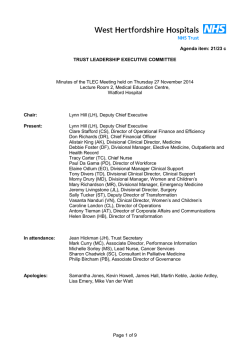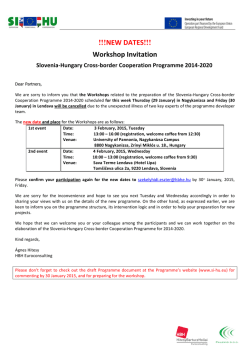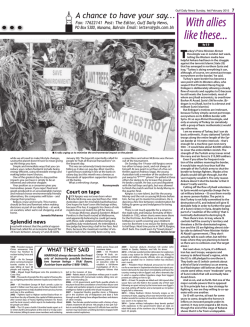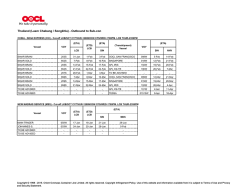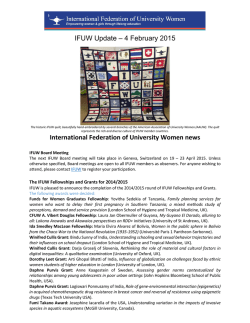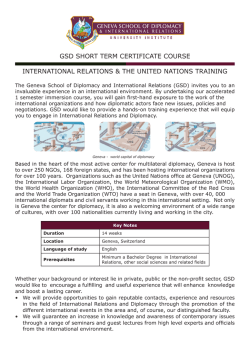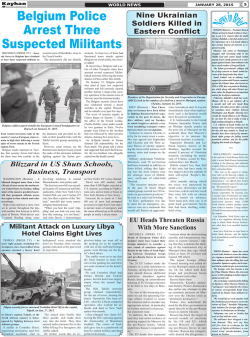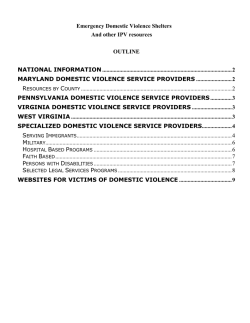
Extreme Risk Country or Region
Publish Date: 02/02/2015 No Changes This Week: Please be aware System Risk Management has asked all members to prohibit travel to extreme risk countries and regions. Please reference memorandum from the Chancellor regarding procedures relating to international travel to be followed by all System members found at this link: http://www.tamus.edu/assets/files/safety/pdf/InternationalTraveltoHighRiskCountries.pdf Should you have any questions, please contact me directly. Thank you. Henry Judah, CPCU CLU ChFC | Associate Director System Risk Management [email protected] 1262 TAMU | College Station, TX 77840‐7896 Tel. 979.458.6234 | Cell 979.820.2006 | Fax 979.458.6247 | www.tamus.edu Country Travel Advisory List: Any travel to the below listed countries requires an International Travel Questionnaire submission to System Risk Management for review. Afghanistan Central African Republic Chad Cuba Democratic Republic of Congo Gaza Strip Guinea Iran Iraq Lebanon Liberia Libya Nigeria North Korea Pakistan Sierra Leone Somalia South Sudan Sudan Syria Yemen Any travel to the specified regions within a country noted below requires an International Travel Questionnaire submission to System Risk Management for review. Cameroon: Due to the heightened threats of crime, kidnapping and general lawlessness, red24 currently advises against all travel to areas within 50km of Cameroon's shared border with Nigeria in the country's Far North, North, and Adamaoua administrative provinces. red24 further advises against all travel to areas located within 50km of Cameroon's shared border with the Central African Republic (CAR) and Chad. Finally, red24 advises against all non‐essential travel to the Bakassi Peninsula, which remains subject to a political dispute between Cameroon and Nigeria Cote d'Ivoire (Ivory Coast): red24 currently advises against all non‐essential travel to Cote d'Ivoire. In addition, all travel to the western administrative regions of Dix‐Huit Montagnes, Moyen‐Cavally and Bas‐Sassandra, which border Liberia, is advised against as these areas are known to be particularly insecure due to the presence of numerous criminal groups and armed militias. Ecuador: Clients should note that the northern border areas near Colombia are considered dangerous due to the presence of drug trafficking groups, as well as Colombian left‐wing and paramilitary militants in the region. Accordingly, clients are advised against all travel to the Sucumbios province and against non‐essential travel to within 50km of the Ecuador‐Colombia border in Esmeraldas and Carchi provinces. In addition, clients travelling to Ecuador are advised that the presence of drug trafficking organizations in the border provinces of Orellana, Pastaza, Morona‐Santiago, Zamora‐Chinchipe, Loja and El Oro has resulted in increased insecurity in these areas. Clients are advised to remain cognisant of these risks when travelling or operating in these areas and adapt their security protocol accordingly Egypt: red24 advises against all travel to the North Sinai governorate due to the threats from crime, kidnapping and terrorism. The risk is particularly high in the vicinity of the shared borders with the Gaza Strip and Israel. red24 advises clients to exercise a high degree of caution outside of resort and tourist areas in the South Sinai governorate due to the threats of civil unrest, crime, terrorism and kidnapping. Persons travelling outside of secure areas should avoid travel at night; all travel should be coordinated with a local escort that is familiar with the security environment. Ethiopia: red24 currently advises against all travel to Ethiopia's northern Afar region, near the country's borders with Eritrea and Djibouti, as armed bandits and a number of rebel groups are known to operate there. These groups have launched attacks on government security forces, as well as attacks specifically targeting foreign nationals, in the past. Given these threats, as well as ongoing tensions between Ethiopia and Eritrea, clients are also advised against all travel to within 20km of the borders with Eritrea and Djibouti. Clients are also advised against all travel to the country's eastern Somali region. Insecurity in the region remains a concern and stems largely from instability in Somalia. Instability is also furthered by sporadic clashes between the Ethiopian military and the separatist Ogaden National Liberation Front that is known to operate predominantly in the Somali region. Due to the threat of communal violence and regular cross‐border clashes between various ethnic groups, red24 also advises against all travel to within 20km for Ethiopia's borders with Kenya, Sudan and South Sudan. Communal violence is also a significant security threat in the western Gambella region and as such, red24 advises against all travel to this region. Georgia: red24 advises against all travel to South Ossetia and Abkhazia due to the threat of conflict involving Georgian, Russian and separatist forces stationed in the respective regions, as well as high levels of criminality, particularly organised crime. There is also a threat from unexploded ordnance in the areas affected by the August 2008 fighting. Israel: red24 advises against all travel to the Gaza Strip due to the threats of conflict, kidnapping and terrorism. Clients are also advised against all travel to within 2km of the shared Gaza Strip‐Israel border and against all non‐essential travel to within 45km of the Gaza border outside of the 2km zone. This is due to the threat of cross‐border conflict and the threat posed by rocket attacks into southern Israel. Clients in or planning to operate in Israel are advised to monitor local media for updates and advisories from the local authorities and take note of emergency procedures, including action required when warning sirens are sounded and the location of safe areas, such as air raid bunkers, in their area of travel. This applies to all areas of the country. red24 advises against non‐essential travel to the West Bank due to a number of security concerns, including terrorism and civil unrest. Persons still intending to travel to the territory should do so during the day only, and keep to major routes, large urban areas and tourist sites. There are a number of closed Israeli military zones; these are usually well signposted and should be avoided. Clients are advised against non‐essential travel to areas within 2km of the border with Lebanon due to ongoing tensions between Israel and the Lebanon‐based militia group, Hezbollah. Please note that the Golan Heights area is currently occupied by Israel. Clients intending to travel to the area should remain on well‐travelled routes (due to the threat of landmines) and not approach the shared border with Syria. red24 advises against non‐essential travel to within 5km of the shared Egypt‐Israel border, outside of towns and cities, due to the threat of cross‐border attacks by militants based in Egypt's Sinai Peninsula. Kenya: red24 currently advises against all travel to within 50km of the shared border between Kenya and Somalia, applicable to the counties of Mandera, Wajir and Garissa and Lamu. Outside of this zone, red24 advises against all non‐essential travel to the aforementioned counties, in addition to Tana River County. As a precautionary measure and due to recent insecurity in the region, red24 advises against all non‐essential travel to the counties of Mandera, Wajir, Garissa, Lamu and Tana River. red24 currently advises clients operating in Nairobi and Mombasa to exercise a high degree of caution at all times, due to the high terrorism threat in the country. Due to elevated security risks, red24 further advises against all non‐essential travel to the cities' respective areas of Eastleigh and Mombasa Island. Mali: Due to various security concerns, particularly the threats of conflict and terrorism, red24 advises against all travel to the northern and eastern administrative regions of Gao, Kidal, Mopti and Timbuktu. Mexico: Due to the high risks of kidnapping, violent crime and an escalating drug cartel‐related conflict, red24 currently advises against non‐essential travel to all states bordering the US, namely Baja California, Sonora, Chihuahua, Coahuila, Nuevo Leon, and Tamaulipas. This advisory extends to the states of Durango, Sinaloa, Jalisco, Michoacan, Guerrero, and Veracruz. Niger: Due to a number of security threats, red24 advises against non‐essential travel to Niger. Furthermore, due to the high risks of crime, kidnapping, conflict and terrorism, red24 further advises against all travel to areas located within a 100km radius of Niger's shared borders with Chad, Algeria, Libya and Mali, and to locations situated within a 50km radius of Niger's shared border with Nigeria in the administrative regions of Diffa and Zinder. Peru: Due to the threats posed by both organized crime groups and the Shining Path left‐wing militant organization, all travel to the following provinces is advised against: Bella Vista, Mariscal Caceres, Huallaga and Tocache (San Martin region); Padre Abad and Coronel Portillo (Ucayali region); Maranon, Huacaybamba, Leoncio Prado, Huamalies and Puerto Inca (Huanuco region); Oxapampa (Pasco region); Satipo (Junin region); Tayacaja and Churcampa (Huancavelica region); Huanta and La Mar (Ayacucho region); La Convencion and Calca (Cusco region); and Carabaya and Sandia (Puno region). Non‐essential travel to within 30km of Peru's border with Colombia and Ecuador in the Loreto region is also advised against. Philippines: Due to ongoing operations by rebels and terrorists, as well as regular clashes between these groups and the Philippine military, red24 advises against all travel to the southern Mindanao region and the Sulu archipelago. This advisory does not extend to the eastern Caraga Region and Davao Region, to which non‐essential travel is advised against. Pirate attacks have been reported off the coast of the Philippines; those planning to sail in the region are advised to contact local authorities prior to departure. Russia: Due to high levels of violence, instability and terrorism, red24 advises against all travel to Chechnya, Ingushetia, Dagestan and Kabardino‐Balkaria (including the Mount Elbrus region). Due to numerous security concerns, red24 also advises against all non‐essential travel to Karachai‐Cherkessia, North Ossetia and Stavropol's south eastern districts of Budyonnovsky, Levokumsy, Neftekumsky, Stepnovsky and Kurskoyi, which border Chechnya, Ingushetia, Dagestan and Kabardino‐Balkaria. red24 also advises caution when conducting travel to within 5km of Russia's shared border with Ukraine due to incidents of clashes in the neighbouring Donetsk and Luhansk regions impacting on Russian territory. Thailand: red24 advises against all travel to Thailand's southern provinces of Yala, Narathiwat, Pattani and Songkhla due to the threats from conflict and terrorism related to an ongoing Islamist insurgency in these provinces. Tensions are currently high between Thailand and neighboring Cambodia over ownership of the Preah Vihear Temple in Sisaket province, as well as the Ta Kwai ('Ta Krabey' in Cambodian) and Ta Muen Thom temple complexes in Surin province, all of which are located along the common border; sporadic clashes have occurred over this issue in recent times. These temples remain closed to tourists and clients are advised to avoid the area. In addition, drug smuggling and banditry are regularly reported in Thailand's border regions, particularly along its shared border with Myanmar; increased vigilance is advised in these areas. Tunisia: red24 advises against all travel into the Djebel Chambi National Park, including the Jebel ech Chambi mountain range, due to the threats of terrorism and conflict. There is an elevated threat of kidnapping and terrorism in southern Tunisia, particularly near the shared borders with Algeria and Libya. Note that many border areas are considered closed military zones. Persons intending to travel in the southern half of Tunisia should exercise heightened vigilance and caution at all times. Clients travelling outside of main cities in this area or near the shared borders with Algeria and Libya should consider travel with a security escort. Turkey: Due to the ongoing threat of low‐level conflict between Kurdish militants and the Turkish military in the south east of the country, red24 advises against non‐essential travel to the provinces of Agri, Batman, Bingol, Bitlis, Diyarbakir, Elazig, Erzincan, Hakkari, Mardin, Mus, Siirt, Sirnak, Tunceli and Van, as well as Mount Ararat (also known as Mount Agri) in nearby Igdir province. Due to isolated incidents of clashes in neighbouring Syria impacting on Turkish territory, clients are advised against all non‐essential travel to within 10km of Turkey's shared border with Syria. Recent incidents have also increased tensions between the countries appreciably, and Turkish authorities have deployed additional security force units to the border region. In addition, thousands of displaced Syrians continue to flee to refugee camps in the region, mainly in the provinces of Gaziantep, Hatay, Kilis and Sanliurfa. Uganda: Uganda is rated as a medium‐risk country; however, certain regions have significant security threats and travel to these areas should be avoided. Due to heightened levels of insecurity stemming from banditry, tribal clashes and cross‐border raids, red24 currently advises against all travel to the Karamoja sub‐region in the north east of the country. red24 further advises against all travel to within 30km of Uganda's shared borders with the DRC and South Sudan, excluding major urban centres. Ukraine: Clients should note that red24 advises against all travel to Ukraine's eastern regions of Donetsk and Luhansk, due to instability and frequent clashes involving armed forces and pro‐ Russia separatist militants. All non‐essential travel to the eastern Kharkiv region is also advised against, due to the threat of potentially violent civil unrest. Clients should also take note of the potential for a rapid deterioration in the security environment elsewhere in Ukraine, specifically in the south eastern parts of the country. red24 further advises against all travel to the Crimea region, due to political uncertainty and the presence of armed personnel, including Russian forces, throughout the region. 2 February 2015 Your Daily News can be accessed through the members-only red24Global app; click here to find out more. News summary Americas AMERICAS - Carnival to be celebrated in South and Central America and Caribbean BRAZIL - Demonstrations expected in Alagoas and Parana states HAITI - Opposition-led strikes and demonstrations to take place countrywide PERU - State of emergency declared in various provinces due to flooding UNITED STATES - Severe winter weather affects Midwest and Northeast Asia and Pacific AFGHANISTAN - Protests in Kabul degenerate into violence BANGLADESH - Factory fire in Dhaka results in fatalities BANGLADESH - Countrywide general strike underway CHINA - Five killed in separatist-related violence in the XUAR THAILAND - Low-level explosions reported in Bangkok Europe and Russia TURKEY - Adverse weather leads to travel disruptions in Marmara region UKRAINE - Ongoing conflict in Donetsk and Luhansk regions UKRAINE - Planned protest to be held in Kiev Middle East and North Africa IRAN - Countrywide commemorations marking Islamic Revolution ISRAEL / WEST BANK - Bombing in Tel Aviv and clashes in Nablus SAUDI ARABIA - US nationals targeted in shooting attack in Al-Ahsa governorate SYRIA - Apparent execution of detained Japanese national YEMEN - Foreign national kidnapped in Aden Sub-Saharan Africa CAMEROON - Casualties reported following armed clashes in Fotokol NIGERIA - Militants launch attack in Maiduguri, Borno State SUDAN - Russian nationals kidnapped in Central Darfur state SUDAN - Curfew imposed following violent protests in Khartoum Americas AMERICAS; 1 to 18 February; Carnival to be celebrated in South and Central America and Caribbean Official festivities associated with the annual Carnival are set to take place in countries throughout South and Central America and the Caribbean between 13 and 18 February; however, auxiliary celebrations began in many places on 1 February. In Brazil, the largest celebrations are expected in Rio de Janeiro, although significant gatherings are also set to occur in Sao Paulo, Salvador, Porto Seguro, Recife, Olinda, Itamaraca, Ouro Preto, Mariana, Diamantina, Curitiba, Florianopolis, Camboriu, and Porto Alegre. The carnival in Barranquilla, Colombia, is also deemed to be one of the largest events in the region. Elsewhere, large celebrations are expected in Gualeguaychu and Corrientes in Argentina; Oruro in Bolivia; Guaranda, Ambato and Azogues in Ecuador; and Cajamarca in Peru. However, smaller gatherings are possible in other urban centres in all of the above-mentioned countries. Localised travel disruptions are likely for the duration of the events, as there will be numerous road closures in place; high demand for public transport is expected. In addition, Carnival celebrations usually attract opportunistic criminal elements who take advantage of the large crowds to conduct petty theft; an increase in street crimes such as pickpocketing is thus probable. Clients in host cities are advised to seek further information on events from local contacts and news sources. Persons in these areas should plan for travel disruptions and are advised to exercise heightened security awareness when attending carnival events. BRAZIL (Country risk rating: High); 2 and 5 February; Demonstrations expected in Alagoas and Parana states Activist groups are set to hold demonstrations in the capital cities of Brazil's Parana and Alagoas states in the coming days, to oppose the proposed increase in bus fares. On 2 February, Fighting Front for Transportation and the Network Against Tarifa - Curitiba have called for a demonstration to be held in Curitiba (Parana state), with participants expected to gather in Luiz Xavier Avenue at 18:00 local time. Student activist groups will hold a demonstration at the Centenary Square in Maceio (Alagoas state) at 09:00 on 5 February. A number of urban centres across Brazil have been affected by demonstrations regarding the proposed increase in bus fares in recent months. The increase in bus fares is a recurring concern in Brazil, with similar grievances having resulted in a wave of public protests in 2013. Recent demonstrations have been marred with violence; as such, the possibility of violence occurring at the upcoming gatherings cannot be dismissed. These events are anticipated to be well attended and localised travel disruptions are expected in their vicinity. Persons in Curitiba and Maceio are advised to avoid the affected areas on the aforementioned days, as well as any related street gatherings, as a general precaution. Persons needing to travel to these areas should adjust their itineraries to make allowances for localised travel disruptions. HAITI (Country risk rating: High); 2 to 6 February; Opposition-led strikes and demonstrations to take place countrywide A coalition of opposition groups has called for strikes and anti-government demonstrations throughout Haiti from 2 February. Strike action is scheduled for 2 and 3 February and public demonstrations have been called for 4, 5 and 6 February. The largest gatherings are expected in Port-au-Prince; additional events are likely to occur in other urban centres countrywide. In Port-au-Prince, demonstrators are expected to congregate at St John Bosco Church in the downtown area. Several sectors, including teachers and transport unions, are expected to participate in the strike; as such, disruptions to business and social services are expected. Travel delays and roadblocks as a result of large-scale demonstrations are also likely. Clashes between demonstrators and security forces cannot be ruled out. Protesters are demanding the resignation of the current administration of Michel Martelly, the lowering of petroleum prices, improvements in the cost of living, as well as increased pay and better working conditions for teachers. The risk of violence at all protests in Haiti is considered elevated, as local police are frequently deployed to disrupt or disperse opposition gatherings. Large-scale and occasionally violent protests, which have been ongoing since 2014, are expected to persist throughout 2015 as the core issues remain unresolved. Clients are advised against all non-essential travel to Haiti due to a number of security concerns. Persons in the country should monitor local developments and avoid all street gatherings and concentrations of security forces as a precaution. PERU (Country risk rating: Medium); 29 January; State of emergency declared in various provinces due to flooding A 60-day state of emergency was declared in Peru's provinces of San Martin, Bellavista and Picota on 29 January, due to severe flooding. According to the National Institute of Civil Defence, the flooding has caused moderate infrastructural damage and is expected to continue affecting the aforementioned provinces in the near-term. The flooding was caused by heavy rains and the overflowing of the Huallaga River. Heavy rainfall is forecast to continue in multiple areas in the coming weeks. Additionally, further disruptions to both localised travel and public utilities should be expected in the affected areas. Persons currently in the affected region are advised to avoid low-lying, flood-prone areas, such as rivers and canals, and should monitor local media for possible flood warnings and emergency broadcasts. Clients should also anticipate disruptions to road travel and the provision of public utilities in flood-affected areas. UNITED STATES (Country risk rating: Medium); 1 and 2 February; Severe winter weather affects Midwest and Northeast Winter storm and blizzard warnings are in place in several states in the US Midwest and Northeast, due to severe winter weather which began on 1 February. Winter Storm Linus has brought heavy snowfall and has led to road closures and associated travel delays. Midwestern states have been worst affected thus far, with power outages reported and blizzard warnings in place for Illinois, Indiana and Wisconsin. In addition, flight disruptions have been reported at airports in Chicago; subways and elevated train services in the city have also been affected. Furthermore, a travel ban was put in place for the Ohio Turnpike from 08:00 local time on 1 February until 12:00 on 2 February due to the prevailing conditions. As the storm tracks eastward, Pennsylvania, Massachusetts and New York are expected to experience adverse conditions and associated disruptions to travel. Further road closures, travel delays and disruptions to services, such as electricity and telecommunications, cannot be ruled out. Clients in the aforementioned areas are advised to make allowances for travel disruptions and should consult their travel provider for an update on the status of services. Persons in areas affected by adverse weather should monitor local media for further information regarding weather warnings, and take precautions against cold and icy conditions. Back to top Asia and Pacific AFGHANISTAN (Country risk rating: Extreme); 31 January; Protests in Kabul degenerate into violence Protests against the publication of a caricature of the Muslim Prophet Muhammad in French satirical magazine, Charlie Hebdo, degenerated into violence in Afghanistan's capital, Kabul, on 31 January. According to reports, several hundred people gathered along Jalalabad Road, a primary thoroughfare in the east of the city, to hold the demonstration. Although the gathering began peacefully, violence erupted when some protesters began throwing rocks at police, as well as attacking some local government offices. Police responded with live ammunition; at least eight people were injured and there are unconfirmed reports that two people were killed. This is the first demonstration in Kabul over the Charlie Hebdo issue that has erupted into significant violence; similar previous protests concluded peacefully. However, given the emotive nature of the topic, as well as the robust response by security forces, further such protest action should be anticipated. In addition, it should be noted that protests will likely carry a considerable anti-France and, by extension, antiWestern sentiment, thereby increasing the incidental risk to Westerners. Localised travel disruptions in the vicinity of protest sites should be anticipated. Due to a number of ongoing security concerns, all travel to Afghanistan is advised against. Clients currently in the country should implement maximum personal, travel and residential security protocols. Travel outside of urban centres should only be undertaken following a full security review of the route, ideally in the presence of a security escort familiar with the local conditions and during daylight hours only. All protest action and concentrations of security forces should be avoided. BANGLADESH (Country risk rating: High); 31 January; Factory fire in Dhaka results in fatalities A large fire resulted in at least 13 deaths and scores of injuries in Bangladesh's capital, Dhaka, on 31 January. The fire broke out at a plastic packaging factory in the city's Mirpur district; although the blaze was brought under control, travel disruptions occurred due to the presence of emergency services and disaster management personnel in the affected area. The cause of the fire is unknown. While investigations into the incident are ongoing, terrorism is not suspected. Building conditions are often hazardous in Bangladesh; in 2013, over 1,000 people were killed when a building housing several garment factories collapsed. In addition, similar building collapses have led to public protests in the past. All such demonstrations have the potential to become violent due to clashes between protesters and security forces, who often employ heavy-handed crowd-control tactics. Clients are advised to avoid any related protests or demonstrations, should they occur, as a precaution. Persons in or near this area should monitor local media for developments and follow any instructions issued by the relevant authorities. BANGLADESH (Country risk rating: High); 1 to 4 February; Countrywide general strike underway A 72-hour countrywide general strike (known locally as a hartal) is underway across Bangladesh on 2 February. The strike began at 06:00 local time on 1 February and will continue until 06:00 on 4 February. The action has been called by a 20-party opposition alliance, led by the primary opposition party, the Bangladesh Nationalist Party (BNP), to protest against the deaths of BNP supporters at the hands of security forces during protest action in recent weeks. In other developments, the ongoing countrywide transport blockade, which has been in place since 5 January, continues on 2 February. Protest action and violence associated with the blockade have continued, leaving approximately 35 people dead since the blockade began. This is the latest round of strike action; the frequency of such strikes has increased sharply since the 5 January anniversary of the 2014 elections, which were boycotted by the BNP. General strikes of this nature can result in widespread travel disruptions to road and rail services and to business operations, especially in light of the ongoing transport blockade. In addition, industrial actions led by the BNP are often accompanied by well-attended protest action. Such gatherings regularly degenerate into violent civil unrest. Past precedent also suggests that the capital, Dhaka, and the city of Chittagong are likely to be focal points for strike-related activity. Due to numerous security concerns, including civil unrest, clients are advised against all non-essential travel to Bangladesh. Persons in the country on strike-affected days should monitor local media for updates and developments, minimise movement as far as practically possible and avoid all protests and strike-related activity. CHINA (Country risk rating: Medium); 28/29 January; Five killed in separatist-related violence in the XUAR Five people were killed in possible separatist-related violence in China's restive north western Xinjiang Uighur Autonomous Region (XUAR) overnight on 28/29 January. Although information remains unconfirmed, police attempted to detain three ethnic Uighur youths at a checkpoint in Yutian (also known as Keriye) county, in Hotan prefecture, on 28 January. Following an argument, the youths stabbed and killed three police officers before fleeing the scene. A large police operation was launched to apprehend the assailants, two of whom were shot and killed by security forces. The third assailant was arrested. Authorities are likely to link the incident to separatist tensions in the XUAR, which stem from claims of China's authoritative and repressive actions towards the region's Uighur population; this has resulted in a separatist insurgency in the XUAR, with Uighur separatists striving for the creation of an independent East Turkestan state. This insurgency has resulted in a number of similar incidents of violence in recent years, leaving at least 400 people dead since the beginning of 2012. An increased security force deployment is likely in the affected area in the short-term; as such, localised travel disruptions should be anticipated. It should also be noted that Chinese authorities heavily restrict access to information on the security situation; consequently, reports of separatist attacks or additional details surrounding previous incidents may only emerge several days after the incident in question. Clients in Yutian county and the wider XUAR are advised to exercise heightened security awareness at this time and make allowances for travel disruptions resulting from the possible increased security measures. THAILAND (Country risk rating: Medium); 1 February; Low-level explosions reported in Bangkok Two small-scale explosions took place in Thailand's capital, Bangkok, on 1 February, leaving one person lightly injured. The explosions, believed to have been caused by pipe bombs, took place on an elevated walkway linking the Siam Skytrain station to the upmarket Siam Paragon mall in central Bangkok. Services at the station were temporarily suspended, but have since resumed. There have been no claims of responsibility for the incident. Although unconfirmed, it is possible that the explosions stem from the current political tensions in the country, following the May 2014 coup by former military chief and interim prime minister, General Prayuth Chan-ocha, in which former prime minister, Yingluck Shinawatra, was ousted from power. Since then, the military has imposed martial law and has banned all protest action. In addition, on 23 January, the legislature voted to ban Shinawatra from politics for five years and impeach her, which could lead to her imprisonment. This has raised political tensions in the country considerably, as she and her Pheu Thai Party (PTP) retain considerable support; indeed, Shinawatra was comfortably voted into power in the July 2011 elections, and again in February 2014, despite the results of the latter being invalidated by the Constitutional Court. It is thus possible that a group or individual with grievances against the political status quo may be responsible for the low-level explosions. An increased security force presence should be expected in the vicinity of the blasts in the near-term. Clients currently in Bangkok are advised to exercise heightened levels of situational awareness and report any suspicious people, packages or activities to authorities immediately. Not sure your travel plans are safe? red24 can provide comprehensive travel safety reports. For more information, click here Back to top Europe and Russia TURKEY (Country risk rating: High); 31 January to 3 February; Adverse weather leads to travel disruptions in Marmara region Inclement weather, including high winds and heavy rain, has resulted in significant travel disruptions in Turkey's Marmara region. Travel disruptions, including cancellations to air and maritime services, were reported on 31 January. National airline carrier, Turkish Airlines, has cancelled at least 229 flights from the Istanbul Ataturk Airport, affecting both domestic and international flights. Several ferry services operating in the region were also suspended. Inclement weather is forecast to continue until 3 February; as such, further travel disruptions to transport services in the region are expected. Persons in the affected area of Turkey are advised to monitor local media for updates and advisories. Clients planning to travel to the affected area are advised to anticipate weather-related disruptions to transport services and should confirm the status of their travel arrangements with their respective service providers. UKRAINE (Country risk rating: High); 29 January to 1 February; Ongoing conflict in Donetsk and Luhansk regions Hostilities, including shelling and armed clashes, between the armed forces of Ukraine and pro-Russia militants continue to be reported; these resulted in a number of casualties along the line of contact between 29 January and 1 February. Heavy fighting and shelling have been concentrated in the Donetsk region, particularly in the eponymous regional capital, as well as the cities of Debaltseve, Mariupol and Yasynuvata. At least 11 people have died in separate incidents in Donetsk, including six people who were killed when a mortar shell landed near the Donetsk cultural centre, striking a trolleybus. A further five people were killed by artillery fire near the Donetsk International Airport on 29 January. On 1 February, 12 people were killed and a further six wounded in Debaltseve, due to shelling in the city. Hostilities in the eastern regions have escalated since 16 January. The initial ceasefire agreement, signed in Minsk in September 2014, has been repeatedly violated by both the military and separatists. On 26 January, a state of emergency was declared for the Donetsk and Luhansk regions. In unconfirmed reports, the Ukrainian government is said to have announced evacuation procedures in the worst-affected areas, including Debaltseve and Mariupol. The continuing hostilities in the east of the country have resulted in the deaths of an estimated 5,000 people, in addition to significant disruptions to transport and utility infrastructure. The security situation in the Donetsk and Luhansk regions is expected to remain tenuous in the short-term at least. The potential for a further deterioration in the security environment persists. Persons are advised against all travel to Ukraine's eastern regions of Donetsk and Luhansk due to instability and frequent clashes involving armed forces and pro-Russia separatist militants. UKRAINE (Country risk rating: High); 2 February; Planned protest to be held in Kiev Members of the Aidar Battalion, a volunteer force attached to the Ukrainian military, have called for a protest in Ukraine's capital, Kiev, on 2 February. The rally will be held in front of the Defence Ministry on Povitroflotsky Avenue, from 12:00 local time. Protest organisers have stated that the group's supporters will be arriving from outside of the capital and that marches are planned to other government buildings in Kiev from the Defence Ministry. The protest has been called in response to the alleged planned disbandment of the volunteer force. The government has denied that it is being disbanded, stating that it is being renamed and rebranded. The protest is the latest to be held by the group. A peaceful demonstration was held on 30 January in the vicinity of the Defence Ministry, causing some traffic disruptions. Further disruptions remain possible at the rally on 2 February. While significant acts of violence are not anticipated, the potential exists for low-level confrontations between members and supporters of Aidar and other local security force personnel. Clients in Kiev on 2 February are advised to exercise caution and should avoid all street protests in the vicinity of the Defence Ministry building on Povitroflotsky Avenue. Follow us on Twitter@red24 Back to top Middle East and North Africa IRAN (Country risk rating: Medium); 1 to 11 February; Countrywide commemorations marking Islamic Revolution Celebrations and rallies commemorating the anniversary of the 1979 Islamic Revolution began on 1 February across Iran and will culminate on the actual anniversary date, on 11 February. The primary event on 1 February was held in the capital, Tehran, when thousands of people gathered near the mausoleum of former Iranian Supreme Leader, Imam Khomeini. The period between 1 and 11 February is known as the 10-Day Dawn festivities. Further large-scale and lowlevel public gatherings are expected across Iran until 11 February. The commemorative period in Iran is highly symbolic and large crowds should be expected to attend planned events in cities across the country. These are likely to carry a high level of anti-US and anti-Israeli sentiment. While significant acts of violence are not anticipated, the risk of low-level confrontations between Westerners and locals increases marginally during this period. In addition, persons near commemorative sites should anticipate road travel disruptions. Clients in Iran in the coming days are advised to monitor local media for updates on the location of planned commemorative events. Travellers, specifically Westerners, should avoid related gatherings and maintain a low public profile. ISRAEL / WEST BANK; 31 January; Bombing in Tel Aviv and clashes in Nablus A bomb exploded in a vehicle in Rehovot, located south of Tel Aviv, Israel, on 31 January. The blast killed one person and wounded two others and is thought to be linked to organised criminal activity. Elsewhere, a Palestinian was fatally shot and another injured in Nablus, in the West Bank, during clashes with Israeli security forces which occurred after the pair had thrown a petrol bomb at a vehicle on 31 January. Both incidents fall within the baseline risks for each respective location. For red24's advisory for Israel and the West Bank, please follow the respective links above. SAUDI ARABIA (Country risk rating: High); 30 January; US nationals targeted in shooting attack in Al-Ahsa governorate A vehicle transporting two US nationals employed by the US defence company, Vinnell Arabia, came under gunfire in Saudi Arabia's eastern Al-Ahsa governorate on 30 January. The attack left one of the two foreign nationals wounded. The identities of the perpetrators are unknown. The incident follows attacks targeting foreign nationals in Dhahran on 29 November 2014, and Riyadh on 22 November and 14 October, as well as the killing of seven Shiite Muslims in the alDalwah area of Al-Ahsa governorate on 3 November. While the motive for the recent attack is unclear, the past incidents suggest that the assailants may be sympathetic to or aligned with Sunni Islamist militants. There has been a general rise in anti-Western and anti-Saudi government sentiment in the wider region recently. This coincides with the conflict in Syria and Iraq, the subsequent rise of the Islamic State (IS) and calls by the group for its supporters to attack Western targets, as well as the initiation of air strikes by a US-led coalition, including Saudi Arabia, against IS in Syria and Iraq. It is likely that the past incidents and current attack have been conducted by self-radicalised individuals. The involvement of an organised militant body is unlikely but cannot be discounted. Given the anticipated security operation to identify and seize the assailants, further violence, including confrontations with the police, remain possible in Al-Ahsa governorate. Clients in the governorate are advised to monitor local media for updates and advisories and should adopt heightened personal security awareness. SYRIA (Country risk rating: Extreme); 31 January; Apparent execution of detained Japanese national Video footage was released of the apparent execution of Japanese national, Kenji Goto, by a member of the Islamic State (IS) in Syria on 31 January. Although the video, posted on militant websites, has yet to be authenticated, it shares hallmark traits of previous execution videos released by the Sunni extremist group. The Japanese government has denounced the execution. The fate of a Jordanian hostage held by the group is unknown, although some reports indicate that he may also have been executed. IS had earlier demanded a ransom of US$200 million for two Japanese hostages, and later demanded the release of a female insurgent held by Jordan, to which that country had agreed in exchange for the Jordanian pilot held by the group. The purported execution of Goto is the latest in a number of high-profile kidnappings and executions of foreigners by IS, most recently the beheading of another detained Japanese national on 24 January. In 2014, IS executed a number of US and other foreign nationals in response to US-led air strikes against the group in Syria and Iraq. The group is currently in control of most of north eastern Syria and parts of central and northern Iraq and uses kidnapping to gain ransoms and also as a political tool. It is one of a number of armed groups in Syria involved in kidnapping operations which have affected both foreign and local interests. The overall kidnapping risk in Syria is rated as extreme. Clients are advised against all travel to the county due to a number of ongoing security concerns. YEMEN (Country risk rating: Extreme); 28 January; Foreign national kidnapped in Aden A foreign national was kidnapped in Aden, southern Yemen, on 28 January; unconfirmed sources claim that the victim was a French national. No group has claimed responsibility for the kidnapping, which occurred when a road was blocked and the victim was forcibly taken from his car by armed men. The threat of kidnapping in Yemen is assessed to be high, affecting both local and foreign nationals. These abductions are typically orchestrated by various tribes, Islamist extremists or criminal groups operating in the country. Due to the elevated threats of terrorism, conflict, kidnapping and civil unrest, clients are advised against all travel to Yemen, excluding the Socotra archipelago. Be the first to know about security risks in your location with red24 alerts. For more information, click here Back to top Sub-Saharan Africa CAMEROON (Country risk rating: High); 29 and 30 January; Casualties reported following armed clashes in Fotokol According to recently released reports, Chadian soldiers repelled a militant attack near the town of Fotokol, located in the Logone-et-Chari region in Cameroon's Far North province. Militants suspected to be aligned with the Nigeria-based Boko Haram Islamist extremist group are said to have detonated explosive devices targeting a border post at which Chadian army forces had been stationed since 28 January. In the ensuing violence, at least three Chadian soldiers and 123 militants were killed; a further 12 Chadian soldiers were injured between 29 and 30 January. Areas along Cameroon's shared border with Nigeria, including those in the Far North province, are periodically subject to militant attacks, with Boko Haram said to be attempting to consolidate its operational presence in the region. The Far North province's border towns of Fotokol, Kousseri, Koza and Dabanga in particular have experienced an upsurge in militant activity, including skirmishes with Cameroonian border patrols, kidnappings and the arrests of suspected insurgents in recent years. Cameroon, in co-operation with Nigeria, Chad and Niger, has been engaged in counterinsurgency operations against the militant group since May 2014. However, these operations often incite retaliatory attacks by Boko Haram against security and/or government installations within the Far North province. Given the high mobility of the militant group and the ongoing counterinsurgency operations, insecurity in the region is likely to persist. Due to a heightened risk of crime, as well as the threat of kidnapping and other security concerns, all non-essential travel within 50km of Cameroon's shared border with Nigeria is advised against. Clients intending to travel to the region despite this advisory should ensure that all movements are coordinated in the presence of a security escort and restricted to populated urban centres. NIGERIA (Country risk rating: High); 31 January and 1 February; Militants launch attack in Maiduguri, Borno State According to reports, militants aligned with the Boko Haram Islamist extremist group launched an assault on Maiduguri, capital of Nigeria's north eastern Borno State, overnight on 31 January/1 February. Clashes between Nigerian armed forces and militants are said to have occurred on the outskirts of the city, including in Dalwa, Ngom, and Njimtilo. Attempts by the militants to siege the city were averted after an estimated 12 hours of fighting. Maiduguri has been a focal point of Boko Haram assaults in recent weeks, with numerous bombings and armed attacks targeting the city. Indeed, the Nigerian armed forces repelled an attack by the group in the city on 24 and 25 January. Security forces have been engaged in an ongoing campaign against the militant group's operational strongholds in the north of the country; however, this has largely failed to significantly reduce the threat. Boko Haram continues to maintain a strong operational presence in north eastern Nigeria, particularly in the Adamawa, Borno and Yobe states. Accordingly, attacks of this nature are likely to continue in the near-term at least, with a possible increase in violence leading up to Nigeria's presidential elections on 14 February. Due to various security concerns, clients are advised against all travel to several north eastern states, including Borno State. Persons in the area should implement robust personal and residential security precautions at all times. These include coordinating all movements in the presence of a security escort and ensuring that all accommodation is within secure compounds. SUDAN (Country risk rating: High); 29 January; Russian nationals kidnapped in Central Darfur state Two Russian nationals were kidnapped in Sudan's Central Darfur state on 29 January. The victims were kidnapped while making their way on foot from the state capital, Zalingei, to the United Nations African Union Mission in Darfur (UNAMID) base when they were forced into a vehicle by armed assailants. The victims were working as contractor pilots for UNAMID. Local authorities have yet to state if a ransom demand has been made or received. Central Darfur is considered an extreme-risk operating environment. Numerous non-state armed groups operate in the area and levels of conflict and criminality are elevated. Kidnapping is also a significant security risk. Foreign nationals employed by either foreign-owned companies or humanitarian organisations have previously been targeted in kidnappings and killings by various groups. Further incidents should be anticipated. The risk is considered highest if travelling at night, without a security escort and outside of secure compounds. Clients are advised against all travel to Central Darfur state. Persons operating in the state, and in the Darfur region in general, are strongly advised to travel with a security escort and to ensure that regular risk assessments are provided by their security provider. Personnel should limit travel at night, particularly outside of secure compounds. Residential areas should have sufficient security, including the presence of security guards. SUDAN (Country risk rating: High); 30 and 31 January; Curfew imposed following violent protests in Khartoum According to reports released on 31 January, a curfew has been imposed in Khartoum, capital of Sudan's Khartoum state. The curfew was imposed following violent protests that erupted in the city's Alshajara and Alhamadab areas overnight on 30/31 January. Protesters had been demonstrating over the expropriation of land, and violence is said to have occurred when police dispersed the crowd using teargas. Tensions remain elevated, with additional police having been deployed to affected areas. Further details regarding the curfew and its duration remain unavailable. Demonstrations regarding the expropriation of land in a number of areas in Khartoum state have been a regular occurrence in recent months. These gatherings have often degenerated into violence, with local authorities imposing curfews to prevent further unrest. Due to the ongoing government land expropriation initiatives, further such demonstrations are expected. In addition, persons operating in the area should anticipate possible restrictions on travel and additional curfew restrictions in light of the recent violence. Due to a number of security concerns, clients are advised against all non-essential travel to areas outside of major towns in Khartoum state. Persons in Khartoum are advised to adhere to the curfew and any other related directives, and should ensure that robust personal, travel and residential security measures are implemented at all times. Looking for comprehensive crisis management assistance services? For more information, click here Back to top © Copyright all rights reserved red24.com
© Copyright 2026
